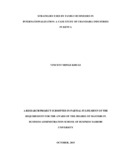| dc.description.abstract | A family business is a commercial organization in which decision-making is influenced by multiple generations of a family related by blood or marriage who are closely identified with the firm through leadership or ownership .Research (National Base Survey 1999) has shown that family businesses account for up to 80 percent of all employment in Kenya. Family-owned businesses have been a mainstay of the Kenyan economy for generations. They play a great part in the growth of the economy. In Kenya, family businesses are renowned for their entrepreneurial and innovative spirit and are a key driver for the Kenyan economy. Family-owned companies face unique challenges in Kenya's competitive business environment. According to the company website (www.Chandaria.com), Chandaria Industries Ltd was founded by Maganlal Chandaria in Mombasa in 1947. The company manufactured paper drinking straws using a converting machine (operated by Mr. Chandaria himself), followed by the manufacture of adding machine rolls, toilet paper, teleprints and other products before the re-location to Nairobi in 1974.Family businesses are seeking to grow and go international. They play a major role in the economy and thus a lot of consideration ought to be given to promote maintain and expand them both locally and internationally. Several studies have been conducted locally and internationally in relation to family businesses. For instance, Okoroafo (1999) investigated a sample of 187 family businesses from Ohio (USA). Based on the available empirical literature above on the family businesses the researches were not able find on the internationalization of Chandaria industries limited, therefore this is the gap in knowledge. Therefore against this backdrop this study will seek to find out strategies used by Chandaria industries to go international. The objective of the study is to establish internationalization strategies used by Chandaria industries limited. The study used case study research design. The study used an interview as a data collection instrument to collect primary data. The data collected was analyzed using qualitative methods. Specifically this study used qualitative content analysis as a data analysis method. The study established that since internationalization is a risky strategy, family owners with high ownership don‘t want to lose economic benefits. Therefore, family ownership will have a negative effect on the degree of internationalization. The long term commitment of FBs can help to assure potential partners and investors of the continuity of the process, and the high level of trust inside the firm can enhance the formation of outside network ties. Financial, managerial and knowledge resources should be considered important resources for any family business seeking to internationalize. | en_US |

